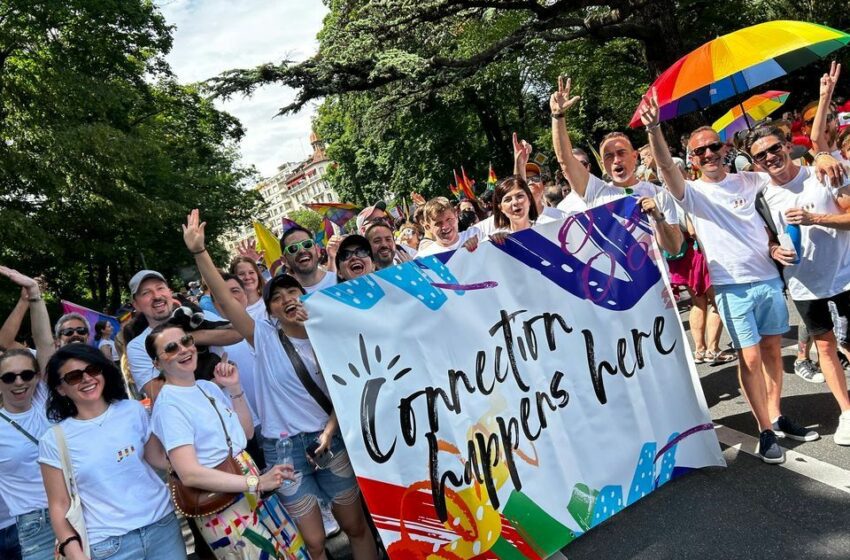Celebrating Diversity
- Also in TR Print Edition
- July 1, 2024
- 0
- 11 minutes read


Diversity and equal opportunities are an integral part of JTI’s business success.
By Stefanie Rossel
According to studies, diversity in the workplace can contribute to smarter decision-making, greater productivity and reduced rates of employee turnover, along with improved corporate reputations. In recent years, companies around the world have increasingly implemented diversity, equity and inclusion (DEI) programs—a collection of practices and policies intended to support people from varying backgrounds and give them the resources they need to thrive in the workplace.
More precisely, diversity is embracing the differences everyone brings to the table, whether it’s someone’s race, age, ethnicity, religion, gender, sexual orientation, physical ability or other aspects of social identity. With different backgrounds come different perspectives, which ultimately lead to better ideas and solutions and better outcomes—or products, for that matter.
To ensure equal circumstances for all individuals across the organization, employers must recognize that not everyone is starting at the same level. Rather than giving everybody the same tools, companies that strive for equity provide employees with what they individually need to have an equal opportunity for success.
Inclusion means that while the workplace requires professionalism and etiquette, employees should not be barred from being themselves; they should not worry about “code-switching” or shielding part of their identity when going to work. Inclusion is what maintains diversity.
Research conducted by McKinsey shows that in 2020, companies worldwide spent an estimated $7.5 billion on DEI-related efforts, a number that was projected to double by 2026. According to a LinkedIn analysis, the number of chief diversity and inclusion officer positions grew by 168.9 percent in the U.S. between 2019 and 2022. However, DEI programs have been under siege from some quarters recently, with U.S. state lawmakers launching efforts to restrict DEI efforts in public schools and universities and companies rolling back their efforts. DEI initiatives, opponents argue, are an overly political, damaging waste of time or a distraction from organizations’ primary activities.
In fact, there has been little scientific research to evaluate the effects of DEI, which emerged at the time of the U.S. Civil Rights Movement in the 1960s. A 2023 review by Boston University researchers found that successful programs were composed of trainings that were grounded in theory. Effective trainings were longitudinal instead of one-time and not only focused on defining concepts but also provided additional support, trainings and skills, such as how to navigate challenging conversations. In successful programs, DEI was not limited to diversity but also emphasized inclusion, meaning companies engaged individuals or groups who had been historically excluded from decision-making activities. This, in turn, drove equity.
Culture of Inclusivity

Geneva-headquartered Japan Tobacco International has had a comprehensive DEI program in place since 2018. “We foster an environment that embraces diversity, ensures equal opportunities and provides a safe space for everyone to contribute,” says Fernando Bonaduce, JTI’s DEI director. “This commitment is integral to our business success. I am proud that all JTI branches worldwide have adopted DEI principles. Our employees play a crucial role in this endeavor. Starting from the highest levels of the organization and extending through our global team, we are nurturing a culture of inclusivity. This gives everyone the freedom to choose, think, express themselves and be authentic.”
In 2020, JTI launched its first employee resource group (ERG), PRIDE, for the LGBTIQ+ community. “Today, we have four ERGs with hundreds of change agents involved in key DEI areas such as gender equality, race and ethnic inclusion, gender identity and sexual orientations or diverse thinking,” says Bonaduce. Changes in corporate culture, he notes, require both time and effort and are “anything but an easy road.”
In 2021, the company committed to increasing women in leadership roles to 30 percent by the end of 2023. “We achieved this ambition in August of that year, well ahead of schedule,” says Bonaduce. “Our commitment to gender equality reflects our efforts to foster a diverse, equitable and inclusive workplace, creating an environment where female colleagues are set up for success.”
One year later, the company’s DEI division was merged with the human resources department, an initiative that has been guided by a DEI strategy focusing on four strategic pillars: strategic commitment, value diversity, building inclusion and nurturing employees’ well-being. “This strategic focus has influenced talent attraction, retention and promotion processes by ensuring all our decisions are geared toward bringing out the human best in our organization. For instance, embedding the DEI principles means that talent management needs to develop a diverse representation in leadership roles,” says Bonaduce.
The company’s DEI-rooted approach, he says, implies that JTI constantly seeks to identify and remove barriers that prevent underrepresented groups from fully participating in the whole recruitment process. Initiatives to achieve this objective include encouraging and monitoring language to not exclude potential applicants based on their background and designing interviews and panels in a way to provide every candidate with the best chance for success. “This approach helps us remove biases from the selection process as best we can,” says Bonaduce.
Work-Life Balance
JTI uses channels and platforms that directly address underrepresented groups, like myGwork, to attract a more diverse applicant pool. The remarkable increase in the number of women in leadership roles, Bonaduce says, is a direct result of the company’s efforts, which aim to enhance the visibility of its top female talents and provide mentorship for them. “Every year, each member of JTI’s global executive committee, except for the CEO, sponsors a senior female talent from around the globe for a period of 12 months. This program aids our talented individuals in their career development, fostering an inclusive and diverse culture from the very top of our organization.”
To help employees recognize and overcome unconscious biases and ensure managers become a catalyst for inclusion and nurture individuals as they are, the company offers various training programs.
Mental health is also an important element in JTI’s DEI strategy. “Our employees dedicate a significant portion of their day to work-related activities,” says Bonaduce. “We know how important physical fitness is for our health and well-being. Unfortunately, people can still hesitate to openly seek psychological guidance or support with mental health due to uncertainty about others’ reactions or feelings of shame. At JTI, we are committed to helping people remove the stigma that still exists in some parts of society.”
The company therefore offers its employees a mental fitness test so that they can check how balanced and healthy they are, live training sessions and a global employee assistance program that provides round-the-clock access to over 40,000 counselors, mental health trainers and specialists 365 days a year. “This service is free, confidential and professional, with assistance available in 200 different languages.” Additional mental health first-aid program modules promote peer-to-peer support on various mental health and personal well-being topics.
Taking Pride in Being Different

PRIDE is a particular success story within the company’s DEI approach. “Having an LGBTIQ+ ERG like PRIDE at JTI is crucial for fostering an inclusive and supportive workplace,” says Rene Staebe, co-founder of PRIDE. “Such groups provide a safe space where individuals can express their true selves, share their experiences and find solidarity among peers. This sense of belonging not only boosts individual well-being and job satisfaction but also enhances overall company performance.” According to research, a third of LGBT+ people in the European Union hide their identity from co-workers, and even more have faced discrimination at work because of who they are.
“Our initiatives focus on educating colleagues, promoting understanding and encouraging open dialogue,” says Staebe. He says he has witnessed remarkable and positive changes across the company since PRIDE’s creation, one of the most significant shifts being the noticeable increase in active allies. “Employees from all levels and departments have stepped up to show their support, especially at senior management level, who have been instrumental in setting a powerful example for others to follow whilst their endorsement has helped embed the values of PRIDE into the fabric of our corporate culture, making inclusivity a core component of our identity,” says Staebe. “We have seen a substantial increase in the number of internal webinars and educational sessions focused on LGBTIQ+ issues providing valuable platforms for sharing knowledge, raising awareness and fostering open dialogue. This has been aided by the implementation of more inclusive policies and practices to include more comprehensive nondiscrimination clauses and more inclusive healthcare and parental leave benefits.”
Meanwhile, PRIDE has a global ERG footprint, with chapters in Canada, the U.S., Switzerland, the Philippines and 13 other countries. Staebe highlights that continuous support is being provided to employees in regions that are not friendly toward the queer community. PRIDE is exploring ways to empower local markets, such as the Middle East, by setting up resource groups while complying with local regulations.
“We are always striving to create a confidential environment where LGBTIQ+ employees can feel safe and valued, which is why it’s so important to have a presence within countries where there are challenges for community members. For this to be possible, we are supported by JTI’s “embassy” model, which enables us to have a presence despite the challenges that people may face,” says Staebe.
In 2023, the company was honored with the Swiss LGBT Label award for the second time. Its progress was also awarded with EY’s Global Equality Standard certification in 2021, in which JTI received several of the highest assessment scores for equal opportunities and equal pay in the workplace. The company has also been recognized as a Global Top Employer.
For a DEI program to be successful, it is important to maintain constant dialogue with underrepresented groups, Bonaduce says. “Feedback from our employees confirms that management is becoming increasingly inclusive. Almost 90 percent of our global employees experience a full sense of belonging to the organization. We also observe our leadership bench becoming even more diverse, with talent from different genders and cultural backgrounds.”


